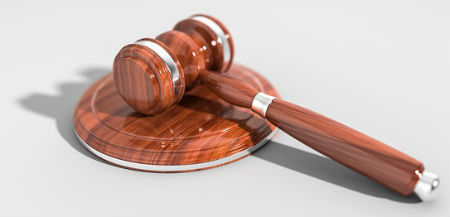News

Michael Barclay
Electronic Frontier Foundation
February 25, 2019
 EFF has just filed an amicus brief in support of Google’s petition asking the U.S. Supreme Court to review the long-running case of Oracle v. Google. The case asks whether functional aspects of computer programs are copyrightable, and involves two dangerous court opinions that held that functional works are both copyrightable and are not fair use as a matter of law.
EFF has just filed an amicus brief in support of Google’s petition asking the U.S. Supreme Court to review the long-running case of Oracle v. Google. The case asks whether functional aspects of computer programs are copyrightable, and involves two dangerous court opinions that held that functional works are both copyrightable and are not fair use as a matter of law.
That Supreme Court review is long overdue. Nine years ago, Oracle filed a copyright suit against Google over the application program interface (API) of the Java programming language. The trial court ruled in Google’s favor, finding the APIs in question weren’t copyrightable. The U.S. Court of Appeals for the Federal Circuit reversed, and Google asked the Supreme Court to review that disastrous ruling. Unfortunately the Court declined, sending the parties back to the trial court to determine whether Google’s use was a fair use. Google won, again, and the Federal Circuit reversed, again. And that means Supreme Court now has another chance to fix this mess.
It should take it. As we’ve explained before, the two Federal Circuit opinions are a disaster for innovation in computer software. Its holding that APIs are entitled to copyright protection ran contrary to the views of most other courts and the long-held expectations of computer scientists. Indeed, excluding APIs from copyright protection was essential to the development of modern computers and the Internet.
While that first Federal Circuit decision was dreadful, things got worse. The Federal Circuit had at least held that a jury should decide whether Google’s use of the Java APIs was fair, and in fact a jury did just that. But Oracle appealed again, and despite having concluded in the first appeal that the fair use defense should be decided by a jury, in 2018 the same three Federal Circuit judges reversed that finding and held that Google had not engaged in fair use as a matter of law.
By overturning the jury, the court created enormous legal uncertainty for any software developer thinking about reimplementing pre-existing APIs. If the first Federal Circuit opinion means that APIs are copyrightable, and the second opinion means that a jury isn’t allowed to decide that using a competitor’s APIs is a fair use, then there are few, if any, ways that a second competitor can enter a market with an API-compatible product.
So we were happy to hear that Google is asking the Supreme Court to step in. In our amicus brief in support, filed today, rather than focusing on why the Federal Circuit was wrong (we’ve already done that), we explain why the Court should take the case (it doesn’t have to). For one thing, the Federal Circuit was supposed to follow the law of the Ninth Circuit (which it didn’t do). Instead, the court created its own dangerous copyright law for computer software. What is worse, courts around the country are following the Federal Circuit’s opinions, instead of decisions from their local appeals courts (such as the Ninth Circuit) as they’re required to do. And the opinion’s mischief reaches beyond the courts, influencing Copyright Office rulemaking and legal scholarship.
In sum, the Federal Circuit has created a copyright mess that only the Supreme Court can fix. We hope that the Supreme Court will agree to review this case and put computer copyright law back on track.
This article was originally published by the Electronic Frontier Foundation and was reprinted with permission.